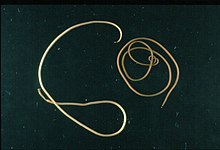Gordioidea
Appearance
| Gordioidea | |
|---|---|

| |
| Gordius sp. emerging from a Stenopelmatus cricket | |
| Scientific classification | |
| Domain: | Eukaryota |
| Kingdom: | Animalia |
| (unranked): | Protostomia |
| Superphylum: | Ecdysozoa |
| Clade: | Nematoida |
| Phylum: | Nematomorpha |
| Class: | Gordioida |
| Order: | Gordioidea Rauther, 1930 |
Gordioidea is an order (sometimes placed at superfamily level) of parasitic horsehair worms. Its taxonomy remains uncertain, but appears to be contained in the monotypic class Gordioida and contains about 320 known species.
Biology
[edit]Gordioidean adults are free-living in freshwater or semi-terrestrial habitats and larvae parasitise insects, primarily Orthopterans. Unlike Nectonematoideans, which are marine, gordioideans lack lateral rows of setae and have a single, ventral epidermal cord and their blastocoel is filled with mesenchyme in young worms but become open when older.[1]
Families and genera
[edit]The Integrated Taxonomic Information System lists the following genera in two families:[2]
Auth. May, 1919; selected genera:
- Subfamily Chordodinae Heinze, 1935

- Chordodes Creplin, 1847
- Dacochordodes Capuse, 1965
- Euchordodes Heinze, 1937
- Neochordodes Carvalho, 1942
- Pantachordodes Heinze, 1954
- Spinochordodes Kirjanova, 1950
- Subfamily Paragordiinae

- Paragordius Camerano, 1897
- Gordionus Müller, 1927
- Parachordodes Camerano, 1897
- Paragordionus Heinze, 1935
- Semigordionus Heinze, 1952
Auth. May, 1919
- Acutogordius Heinze, 1952
- Gordius Linnaeus, 1758
References
[edit]- ^ Pechenik (2010) Biology of the Invertebrates, p. 457.
- ^ "Gordioidea". Integrated Taxonomic Information System.
External links
[edit] Media related to Gordioidea at Wikimedia Commons
Media related to Gordioidea at Wikimedia Commons
